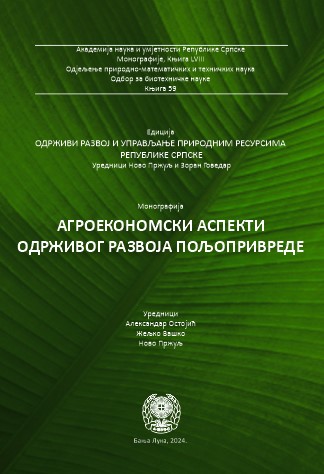Food loss and waste reduction – a new challenge for all stakeholders in food supply chain
DOI:
https://doi.org/10.7251/EORU2410553VKeywords:
Food, food losses, food waste, world development goalsAbstract
In line with the trend of population growth in the world, increasing food production becomes imperative for the agricultural sector, especially since even with the current population, one billion people were malnourished or hungry. The opportunity to increase food production is mainly reduced to increasing yields and is less based on increasing cultivated areas and the number of domestic animals. The productivity of agriculture increases through its intensification, that is, greater application of artificially produced inputs (fertilizers, pesticides, antibiotics, etc.), which threatens the health safety of the food produced in this way and leads to an increase in nature pollution. This closes a circle in which the survival of humanity is conditioned by the reduction of health food safety and the degradation of the environment. As a logical counterbalance, an ecological movement emerged that advocates food production based on sustainable principles, the use of natural inputs and processes, and the preservation of nature. That logic would be acceptable to everyone if it did not materialize in the contradiction of "more ecology, less (more expensive) food". In addition to environmental activists, the goal of producing food in an ecologically acceptable manner was also adopted by the EU as one of its longterm strategic goals (the so-called "Green Plan"). One of the possibilities of increased satisfaction of the food needs of the world population, instead of increasing its production, is the reduction of losses and waste of already produced food, which has become one of the world's development goals since 2015 (SDG 12.3. - halve global food waste per capita at the retail level and consumer level and reduce food losses along production and supply chains by 2030). Terminologically, food losses are related to the phases of its production, distribution and processing, and food waste to the phase of food trade and consumption. Practically, the effect of increasing food production can be substituted by the effect of reducing food losses and waste, which has become a new challenge for all participants in the food supply chain, from producers, through distributors and traders to consumers. The scientific community is also one of the participants in that process, which contributes with its research to identify causes and find solutions to reduce food losses and waste. The facts presented in this chapter aim to draw attention to the issue of food losses and waste with a focus on the situation in Bosnia and Herzegovina. The treatment of the selected topic begins with the argumentation of the growing need for food in the world, primarily due to the increase in the number of inhabitants and the goal of eradicating hunger and malnutrition. It continues with the projection of limited possibilities for the production of significantly larger quantities of food in the future. After that, the concepts of food loss and waste and ways of measuring them are introduced. The key chapter is the dedicated to assessing the scope and causes of food losses and waste in Bosnia and Herzegovina. An overview of food losses and waste along the supply chain is also given, based on selected literature sources. The chapter ends with a review of the hierarchy of food waste disposal with concrete proposals for reducing food losses and waste in the BiH environment.
